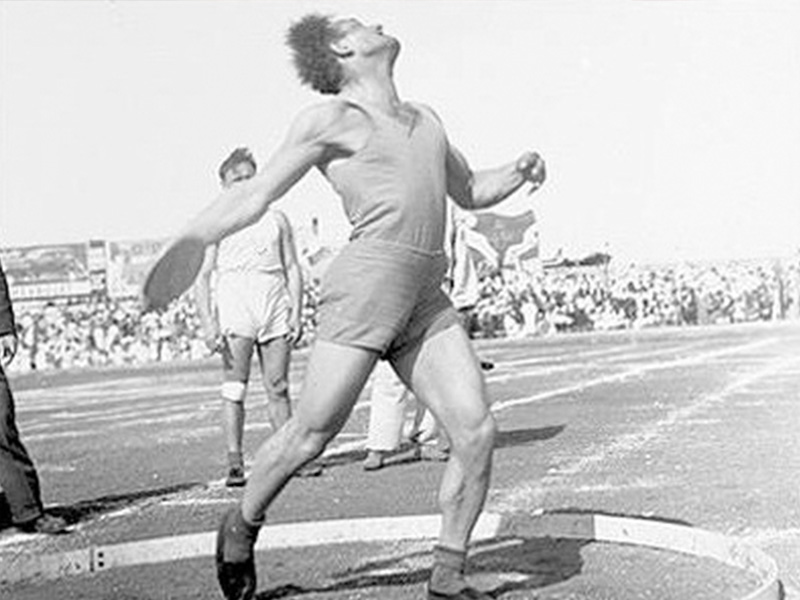“I may be wrong, but there might be a perception that Jewish kids are not athletic. Maybe I can change that trend.”
– Olympic Gold Winner and Maccabiah participant Lenny Krayzelburg.
Although the Maccabiah may not have the international profile of other sporting events, some athletes appreciate it for the value its founders tried to instil. American swimmer Lenny Krayzelburg won three gold medals in backstroke at the Sydney Olympics. Prior to the 16th Maccabiah in 1991, he made waves when he announced that he planned to skip that year’s World Swimming Championships in Japan so that he could compete at the Maccabiah.
80 Years of the Maccabiah
In part one of my Maccabiah history, we began our exploration of the world’s premier Jewish sporting event, the 20th Maccabiah Games, which begins on July 13 in Israel. Over the years, the Games have attracted some big names (in addition to Krayzelburg, there’s fellow swimmer Mark Spitz, tennis player Brad Gilbert, gymnast Mitch Gaylord and windsurfer Gal Fridman).
It’s no surprise that there will be delegations from the United States, Canada, France and Australia. But the most recent Games brought together 9,000 athletes from 78 countries, including missions representing Mongolia, India, Suriname, Gibraltar and Guinea-Bissau. And the athletes compete in a huge variety of sports, some familiar to the Olympic community, like swimming, sailing and triathlon and others not: ten-pin bowling and futsal, a type of indoor soccer.
The Maccabiah, known as the Jewish Games, is open to Jewish athletes from around the world. However, the competition also welcomes all Israeli citizens regardless of religion. In 2005, Asala Shahada, an Israeli Arab teenage girl from the town of Sakhnin, won gold in the women’s 200-metre breaststroke. “The Maccabiah belongs not only to all the Jews,” said Shahada, “but also to all the Israelis, and I am a proud Israeli.”
Those sentiments are not universal. An Israeli Arab dance group cancelled its participation in the same Games. According to the group’s manager, Widad Atalla, “It is a Jewish endeavour; it is not connected to Arabs.”
Promotional video for the 2017 Maccabiah
But the Games have also attracted criticism for being racist, and for being what is, essentially, a huge “dating festival.”
Writing in the Hebrew edition of Haaretz, Israeli sports broadcaster Ron Kaufman called the Maccabiah “the most racist enterprise in world sports.” Kaufman admits the Jewish Games once served a purpose. “The first Maccabiah in 1932 and the second in 1935 played an important role in bringing Jews to Israel. The third time, in 1950, two years after the establishment of the State, was an important message to the European Union of the time: their extermination, their extradition, their abuse – but we are still here, it’s hard to get rid of us.”
Nowadays though, Kaufman finds no justification for the event’s continuation. “If the Islamic Olympics were held and Israel was not invited, the sweating prime minister and the podium-loving sportsman would cry ‘This is anti-Semitism, but why only Islam?’” Besides, “The Maccabiah is no longer a sporting event. It’s a huge jamboree with embarrassing sports activities or the J-Date Dating Festival.” Ouch.
Speaking of J-Date, back in 2001, Denver’s Todd Schayes came to the Games as a basketball player/coach, but it seems he was also interested in events beyond the court. During the televised opening ceremonies, the 36-year-old athlete held up a sign that read: “Single male. American. Looking for Israeli wife. Contact Todd Schayes at the Tel Aviv Hilton.” Over 4,500 women did just that. Unfortunately, none of them seemed to be his bashert. Although the New York Times did report on one Israeli Yiddishe Mamma with more than a bit of chutzpah. She called [Schayes] “and said she has a son, not a daughter, and asked if Todd would give her his list when he had finished, so she could find a bride for her boy.”
Fortunately for Schayes, the story didn’t end there. Back in the U.S., Elaine Housman of Kent, Conn. was reading about the athlete and his Maccabiah exploits in her local Jewish paper. “I screamed, ‘I have found the man for Diane!’” Housman wrote Schayes to tell him about her 30-year-old niece, Diane Lipner. As reported in the New York Times, Todd and Diane’s email relationship developed into a full-blown courtship, and culminated in their 2003 wedding.
Although Schayes’ quest started in front of TV cameras at the Maccabiah Games in Israel, his relatives say he really doesn’t seek the limelight. “He’s very low-key, very mellow,’’ said Jon Housman, a cousin of the bride. “He told me: ‘I’m not a hopeless romantic. I’m a hopeful romantic.’”
